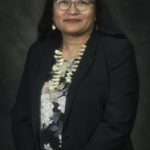
This is the third of a five-part series. Part one is here and part two is here.
 Ron Jetty, a member of the Spirit Lake Dakota and Turtle Mountain Chippewa, is executive director of Information Technology Academy at the Division of Information Technology (DoIT) at the University of Wisconsin-Madison, and Assistant Director of DoIT Academic Technology. He is a member of the UW’s Native Nations Strategic Working Group. Prior to taking that role in 2015, he served as director of PK-16 initiatives for the entire UW System and spent 14 years as an instruction and professional development consultant at the Wisconsin Education Association Council. He holds a PhD in curriculum and instruction from the UW-Madison.
Ron Jetty, a member of the Spirit Lake Dakota and Turtle Mountain Chippewa, is executive director of Information Technology Academy at the Division of Information Technology (DoIT) at the University of Wisconsin-Madison, and Assistant Director of DoIT Academic Technology. He is a member of the UW’s Native Nations Strategic Working Group. Prior to taking that role in 2015, he served as director of PK-16 initiatives for the entire UW System and spent 14 years as an instruction and professional development consultant at the Wisconsin Education Association Council. He holds a PhD in curriculum and instruction from the UW-Madison.
 Ethel “Marie” Summers is a councilwoman for the Oneida Nation Business Committee (OBC). Summers began her career at the Oneida Health Center eventually finding herself in Human Resources, and from then her “career was human resources driven,” Summers said, according to her bio. She was the HR Director for a tribe in California and worked HR and HR Director roles with the Navajo in New Mexico, the Quinault Indian Nation in Washington, and the Saginaw Chippewa in Michigan. While pursuing an education in law, Summers’ interests shifted and, while still working as a loan officer with Comprehensive Housing then as a trial clerk on the Oneida Judiciary, entered herself into the running for her current position. Summers received her GED and her associate degree in Management Development from Milwaukee Area Technical College. She has a degree in Business Administration from Concordia University and is currently pursuing a master’s degree in Indigenous Law Legal Studies.
Ethel “Marie” Summers is a councilwoman for the Oneida Nation Business Committee (OBC). Summers began her career at the Oneida Health Center eventually finding herself in Human Resources, and from then her “career was human resources driven,” Summers said, according to her bio. She was the HR Director for a tribe in California and worked HR and HR Director roles with the Navajo in New Mexico, the Quinault Indian Nation in Washington, and the Saginaw Chippewa in Michigan. While pursuing an education in law, Summers’ interests shifted and, while still working as a loan officer with Comprehensive Housing then as a trial clerk on the Oneida Judiciary, entered herself into the running for her current position. Summers received her GED and her associate degree in Management Development from Milwaukee Area Technical College. She has a degree in Business Administration from Concordia University and is currently pursuing a master’s degree in Indigenous Law Legal Studies.
 Justin Lepscier is a member of the Menominee Nation and is a grants financial analyst with FSA, an investment group that provides investment management and wealth planning for Indian tribes and high net worth individuals. He moved to that position in July 2021, after being the Finance Manager for the Menominee Nation for more than two years. He is also the board chairman of the Wolf River Development Co., which operates current non-gaming tribally owned businesses and looks for new business opportunities both on and off the reservation.
Justin Lepscier is a member of the Menominee Nation and is a grants financial analyst with FSA, an investment group that provides investment management and wealth planning for Indian tribes and high net worth individuals. He moved to that position in July 2021, after being the Finance Manager for the Menominee Nation for more than two years. He is also the board chairman of the Wolf River Development Co., which operates current non-gaming tribally owned businesses and looks for new business opportunities both on and off the reservation.
 Dr. Lisa Poupart is an associate professor of First Nations Studies, Women’s and Gender Studies, and Humanities at UW Green Bay and a member of the Lac Du Flambeau Band of Lake Superior Anishinaabeg. Dr. Poupart’s work is concerned with healing First Nations generational historic trauma and she is also involved in a number of initiatives to standardize First Nations Studies curriculum in K-16. Her collaborative book “Connective Pedagogy: Elder Epistemology, Oral Tradition and Community” explores the traditional knowledge and teaching methodology of the Tribal World (2013, Aboriginal Issues Press/University of Manitoba). Dr. Poupart works with First Nations oral traditional elders and First Nations youth in higher education settings.
Dr. Lisa Poupart is an associate professor of First Nations Studies, Women’s and Gender Studies, and Humanities at UW Green Bay and a member of the Lac Du Flambeau Band of Lake Superior Anishinaabeg. Dr. Poupart’s work is concerned with healing First Nations generational historic trauma and she is also involved in a number of initiatives to standardize First Nations Studies curriculum in K-16. Her collaborative book “Connective Pedagogy: Elder Epistemology, Oral Tradition and Community” explores the traditional knowledge and teaching methodology of the Tribal World (2013, Aboriginal Issues Press/University of Manitoba). Dr. Poupart works with First Nations oral traditional elders and First Nations youth in higher education settings.
 Gary Besaw of the Menominee Nation, Bear Clan, is director of the Menominee Tribal Department of Agriculture and Food Systems (DAFS), and the Menominee Tribal Food Distribution Department. The primary function of the DAFS is to provide regulatory oversight, assistance, and development support to individual, institutional and tribal agricultural and food system initiatives to create sustainable and resilient food and economic diversification systems. Besaw has served for 15 years on the Menominee Tribal Legislature, twice as Tribal Chairman, also as Vice-Chairman and Secretary. He has worked serving Native American K-12 education as Superintendent, Administrator, Vice-Principal, Curriculum Coordinator, Art Instructor, and as a Tribal College Dean of Student Services. Besaw holds an MS in Education Administration from UW-Madison, and a BS in K-12 Art Education from UW-Stout.
Gary Besaw of the Menominee Nation, Bear Clan, is director of the Menominee Tribal Department of Agriculture and Food Systems (DAFS), and the Menominee Tribal Food Distribution Department. The primary function of the DAFS is to provide regulatory oversight, assistance, and development support to individual, institutional and tribal agricultural and food system initiatives to create sustainable and resilient food and economic diversification systems. Besaw has served for 15 years on the Menominee Tribal Legislature, twice as Tribal Chairman, also as Vice-Chairman and Secretary. He has worked serving Native American K-12 education as Superintendent, Administrator, Vice-Principal, Curriculum Coordinator, Art Instructor, and as a Tribal College Dean of Student Services. Besaw holds an MS in Education Administration from UW-Madison, and a BS in K-12 Art Education from UW-Stout.
Part four coming tomorrow!



